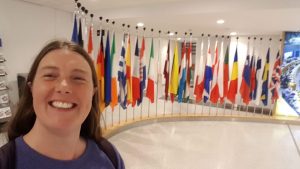1. What languages do you speak?
Chinese and English.
2. How and why did you become a translator?
When I was a graduate student in the United States, I followed several scientific Wechat official accounts that focused on selecting and translating newly published journal articles into Chinese. When they called for contributors, I tried submitting some my translations. Then I found that I always missed some details when I was just reading the papers. But for precise translation, I was forced to scrutinize each and every word, which helped me a lot in my research. And I also started enjoying the thinking process of converting languages, and translation became my hobby.
3. What do you like most about being a part of the EC Innovations’ Community? / What do you enjoy most about working with EC Innovations?
ECI is the first translation agency I worked with. Before joining ECI, I actually knew little about the formal translation process and regulations. My best experience is the PMs reply my questions timely and patiently, which helps me gain a lot of knowledge and experience. Meanwhile, I also realized I had many errors and omissions. So I’m grateful for their tolerance.
4. How has your localization project manager helped you to do your best work?
They answer my questions and inquiries timely and patiently. For my suggestions, they also give feedback, no matter they accept them or not. Such communication benefits me a lot.
5. What’s the most interesting content you’ve translated?
When I just began practising translation, there was an article about how scientists proved that parts of our brain is still active to keep alert when we sleep at a new place for the first night. Their finding confirmed the phenomenon that some people don’t sleep well when they move to a new place is real, and revealed the biological reason.
6. What skills do you find critical to be an excellent translator?
I think the ability of searching for information through Internet is critical. The range of a translator’s knowledge is hard to cover every detail in the source article. Searching, filtering, and understanding new information with the help of Internet is key to successful translation.
7. What is your favorite non-English word and why is it your favorite?
My favourite phase is my high school motto “存诚、能贱”, or “Be honest, be cheap”. “Be honest” means we should always hold sincereness and be honest in our heart. “Be cheap” means we should not think highly of ourselves and should be willing to do some seemingly insignificant or humble work. I never saw another school using “cheap” in the motto. Having such guidance while I was still young had a great impact on my life thereafter.
8. What do you like to do outside of work? How do you achieve work-life balance?
I’m a big fan of musical. But for the reason we all know, I seldom went to the theater for last several years. But thanks to video website Bilibili, my family can still enjoy the show with me.
9. Things that visitors to your area should not miss?
I’m now living in the city of Changzhou, China. You must visit South Hill Bamboo Forest and taste Tianmu Lake Fishhead Soup if you come here. Recently, Changzhou was awarded as the “Capital of Jiangnan Delicacy”. The catering business here does maintain a high level. Or, quoting one of my friends who visited Changzhou many times, “You can randomly pick a restaurant on the street and you won’t be disappointed.”
10. What’s the best career advice you’ve ever received? / What advice would you give to translators who are just starting out?
I fumbled along my way of an amateur translator, driven by my interest. So far, I haven’t decided to be a professional translator, just want to be a good one. So I never searched for or received any career advice. If I had the chance to speak to the new comers, I would say treating each translation seriously and carefully, and search more, learn more, and accumulate more.
